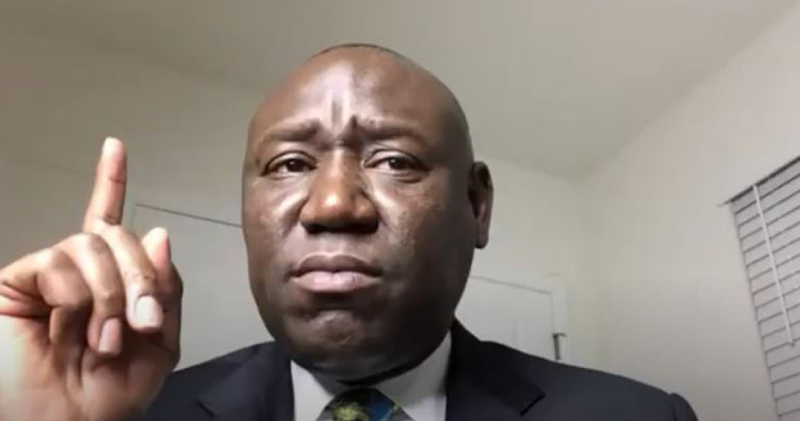


Speaking out for justice
January 11, 2021
We all can (and must) fight for equality, attorney tells UD audience
When Benjamin Crump looks at his daughter, he said he sees hope for a better America, and an obligation to give her a brighter future.
When he thinks of his mother, he can still hear her sharp words of advice: “If you don’t bring anything to the table, don’t expect anybody to let you sit down with them.”
So when the feisty civil rights attorney sees the grim spectacle of senseless police killings, and the angry protests that have followed, his mother’s words and his daughter’s love still serve as indelible inspiration: To stand up and speak out, to fight on for justice in a nation where such injustices somehow linger.
“I look at the young people, and see so much hope and optimism in their eyes,” Crump told a virtual crowd at the University of Delaware Center for Black Culture’s annual Pre-Kwanzaa Celebration. “I look at my own children’s eyes, and I just say we gotta keep fighting, we gotta be focused, and no matter what happens, we’ve got to continue, as our ancestors did in the slave fields, to see past just today, to see a brighter future for our children and our children yet unborn. That’s what we’re fighting for. That’s what keeps me going.”
Crump’s high-profile quest has intensified in recent months, leading him to serve as attorney for the families in several notorious police violence cases, including Ahmaud Arbery, Breonna Taylor, George Floyd and Jacob Blake. Even as Crump worked, he watched as 2020 turned into a year of plague and even deeper despair, especially for the nation’s minority communities.
“We in Black America not only had to deal with the 2020 pandemic, we had to deal with the ‘1619 pandemic,’ ” he said, referring to the year the first slave was brought to the American colonies. “For 401 years, we have been fighting systemic racism and oppression.”
Yet that fight has still left so much undone, Crump said. So many Black and brown people are still dying — and struggling, and striving for equality.
“We have to fight for them, because somebody fought for us to be at this great educational institution of the University of Delaware,” he told event host Brooklynn Hitchens, a 2013 UD graduate and soon-to-be sociology professor at the University of Maryland. “We have to make sure we reach back and try to have a place at the table for our other brothers and sisters.”
When he was younger, Crump saw how often that place was denied to Black Americans. As a student in Lumberton, North Carolina, he and other Black children were bused to the white side of town, where they sat in astonishment at the comparatively well-appointed school there. “I said to myself, ‘I wonder why certain communities in certain parts of town have it so good, and why my community and my part of town have it so challenging?’”
His questions would only grow with time. How could Black Americans make up 13% of the population, but account for 75% of police chokehold cases, and 50% of no-knock warrants? How could a Black man be tortured to death in broad daylight by the same officer who promised to “serve and protect” him?
The answer, he would conclude, isn’t so much in the men, but in the machine that was created to keep him on the ground. “We have to remember that the history of policing in America is the ‘slave patrol.’ Since the inception of this country, the police have killed Black people and not been held accountable for it,” he said. “I think it’s very clear there is a deliberate intent to target Black people and kill us, and this is a system that exists within the American government.”
Changing that system demands that more people take the fight inside its hallowed halls, he said. More Black people need to step up and eagerly serve on juries, and more need to keep politicians and prosecutors in check through their vote, he believes.
“A lot of times, for whatever reason we’re just apathetic,” he said. “If we come out and vote, we become a critical mass in deciding who is going to represent our community in the courtroom, in the local city government and in the school boards. And so that’s on us.
“And we are making progress slowly — but it is slow. We have work to do, I am encouraged, because you as the students of the University of Delaware, you all represent the very best that we have to offer for the future. I look at you all and I know our future is bright.”
Contact Us
Have a UDaily story idea?
Contact us at ocm@udel.edu
Members of the press
Contact us at 302-831-NEWS or visit the Media Relations website

